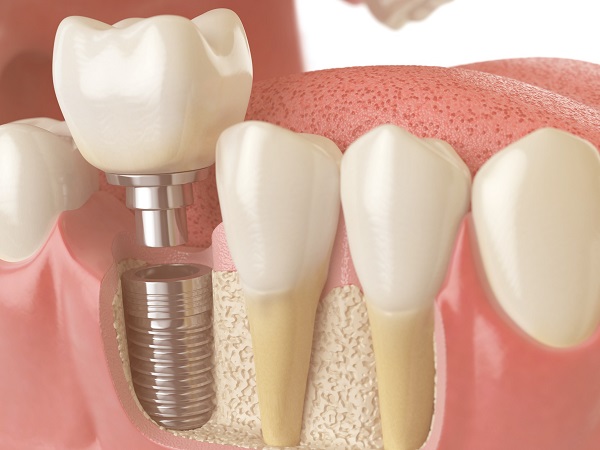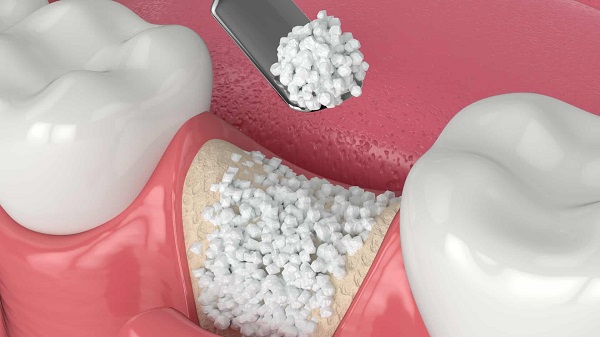Is the bone grafting method for dental implants painful?
Dental implant placement is an effective method for restoring teeth and is chosen by many people. However, before undergoing the procedure, many people wonder if the process of bone grafting and implant placement is painful. According to Dr. Nguyen Anh Ngoc, Director of Professional Affairs at Home Dental Clinic, before bone grafting and implant placement, the dentist will use local anesthesia to numb the bone and teeth area. Therefore, during the entire procedure, you will not feel any pain or discomfort.
Contents
Does bone graft for dental implants hurt?
Leading dental professionals in the field of maxillofacial surgery have shared that during the process of bone grafting for dental implants, patients should not feel any pain as the dentist will administer local anesthesia before the procedure. The anesthesia will block the transmission of nerve impulses from the periphery to the central nervous system, completely controlling the pain in the area where the bone graft is required.
However, as the process involves surgical instruments, some discomfort, and soreness may be experienced after the surgery. Nevertheless, these symptoms will quickly subside and disappear entirely after a few days.
It is recommended to use pain relief medication as prescribed by the dentist. Additionally, applying ice packs can help alleviate discomfort quickly. Patients should use specialized ice packs or a cold compress for 10-15 minutes on the outside cheek of the bone graft area. Moreover, patients should consume soft, liquid foods, avoid exerting excessive force, and refrain from brushing their teeth for the first two days to prevent contact with the newly grafted bone.

What are the causes of prolonged pain and discomfort after bone grafting for dental implants?
According to the information we shared earlier, postoperative pain and discomfort after bone grafting for dental implants typically only lasts a few days. However, some patients experience prolonged and persistent pain and discomfort that does not subside. This phenomenon often occurs due to the following reasons: unreliable bone grafting facilities, poor-quality bone grafting materials, and lack of expertise of the dental professional performing the procedure
Low-quality bone grafting facilities/clinics
The location where bone grafting is performed is one of the factors affecting the success of implant surgery. Many people opt for cheap options and have the surgery performed at small, unlicensed facilities. The consequence is severe pain and negative impacts on oral health, which directly affect daily life and work.
In addition, low-quality facilities often do not offer warranties. Therefore, if you experience prolonged pain symptoms, you will not be able to receive proper postoperative care and treatment.
The lack of expertise of the performing doctor during the bone grafting procedure
The level of expertise of the practitioner performing bone grafting is a crucial factor in minimizing pain and complications after the procedure. A highly skilled and experienced practitioner will carry out the bone grafting process meticulously and with a high degree of accuracy. However, if the practitioner is inexperienced, errors during the bone grafting process may occur, increasing the risk of infection. Moreover, the surrounding tissue may be easily disturbed, leading to bleeding, swelling, slow wound healing, and allowing bacteria to enter the area.
Poor quality grafted bone material.
The quality of the bone material used in grafting is one of the causes of prolonged, nagging pain. Using non-homologous bone material (specifically, bovine bone) or low-quality artificial bone material can make the bone integration process difficult. These materials are easily rejected by the body after a short time, making the feeling of pain and discomfort unavoidable. In the long run, this phenomenon can have a significant impact on oral health, as well as causing fatigue and discomfort.

Where is it safe to get bone grafts and implants to avoid complications?
To ensure safety and avoid prolonged pain after bone grafting and implant placement, it is recommended to choose reputable facilities for the procedure. A reliable dental clinic should meet the following criteria: modern equipment, advanced technology, skilled and experienced dentists, and a closed process.
The medical equipment is fully equipped and the clinic is well-appointed.
A fully equipped infrastructure also plays an important role in the success of bone grafting and implant procedures and helps to minimize any discomfort or pain. With the support of modern equipment, the bone grafting process can be carried out precisely and minimizes the intrusion into surrounding tissues. Therefore, it is important to compare and evaluate the medical equipment before deciding on a bone grafting and implant facility.
Keeping up with the latest advanced technology
Performing bone grafting at reputable locations with modern technology support can greatly increase the success rate. Especially with advanced anesthesia technology, the doctor will directly apply anesthesia to the bone grafting area, so you will not feel any pain. This makes the surgery safe and convenient.
In addition, with new technologies, the bone grafting process will not affect surrounding areas, promoting the healing process and ensuring that there are no dangerous risks after surgery.
The doctor performing the procedure has many years of experience.
Although not a very complex technique, bone grafting, and implant placement require to be performed by a highly skilled and experienced doctor. Only competent doctors can meet the high professional standards, meticulousness, and awareness of the condition as well as anticipate potential complications. From there, the doctor can propose preventive measures and perform effectively to achieve the best results.
The process of dental implant placement is a closed-loop system
To minimize prolonged pain and potentially dangerous complications, the bone grafting process needs to be carried out in a scientific and closed process. All equipment and tools used during surgery must be thoroughly sterilized to avoid the entry of bacteria or external agents that can cause inflammation and infection.
With the information shared in this article, you may have partially answered the question “Does bone grafting with dental implants hurt?” In summary, the level and duration of pain after bone grafting depends on many factors, especially the skills of the doctor. Therefore, you should carefully consider the dental clinic before choosing to prevent dangerous complications.
